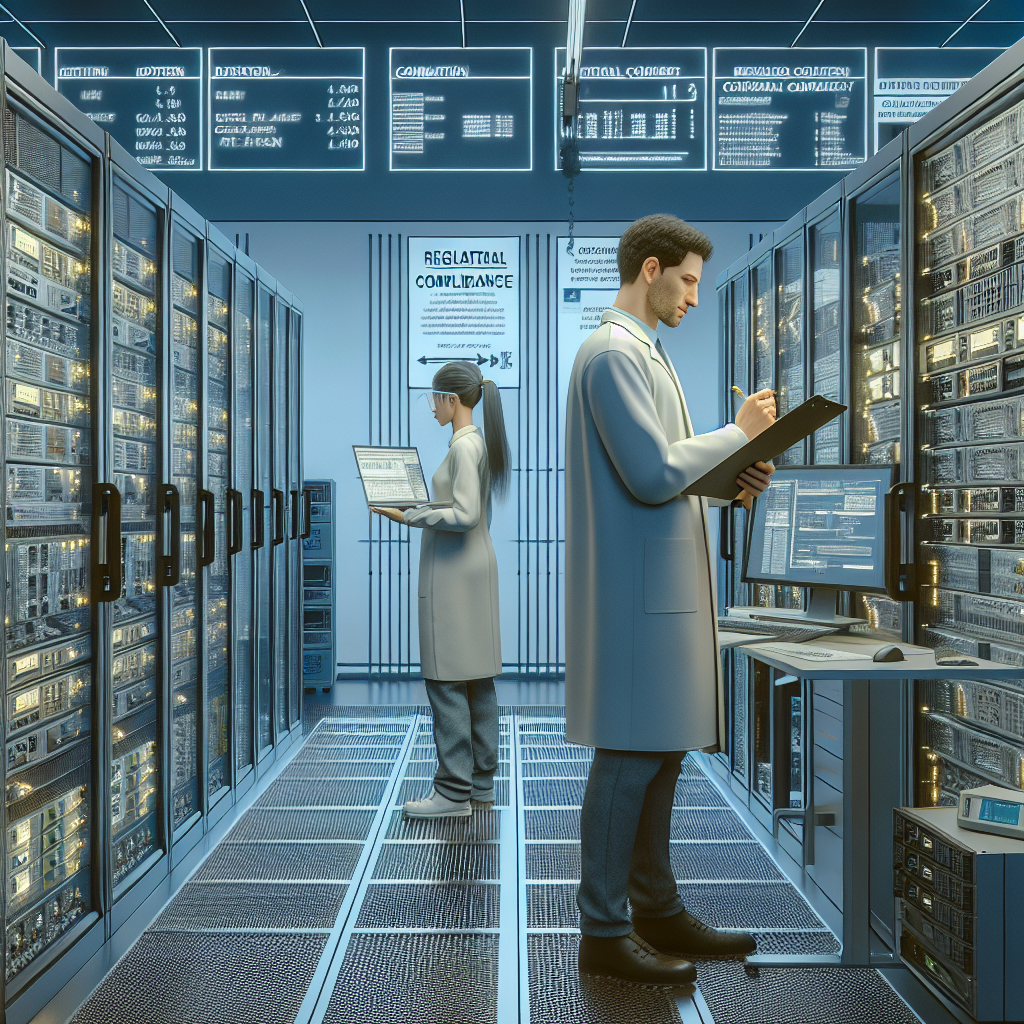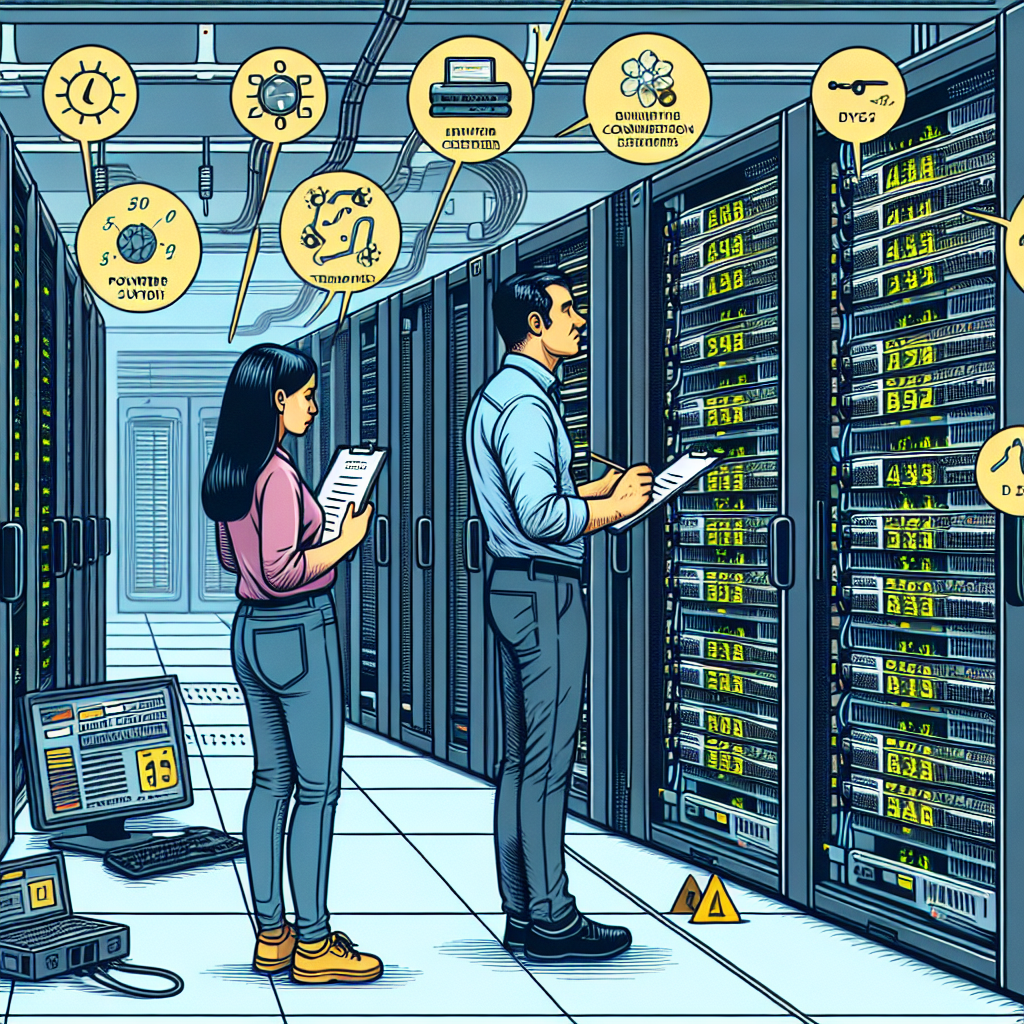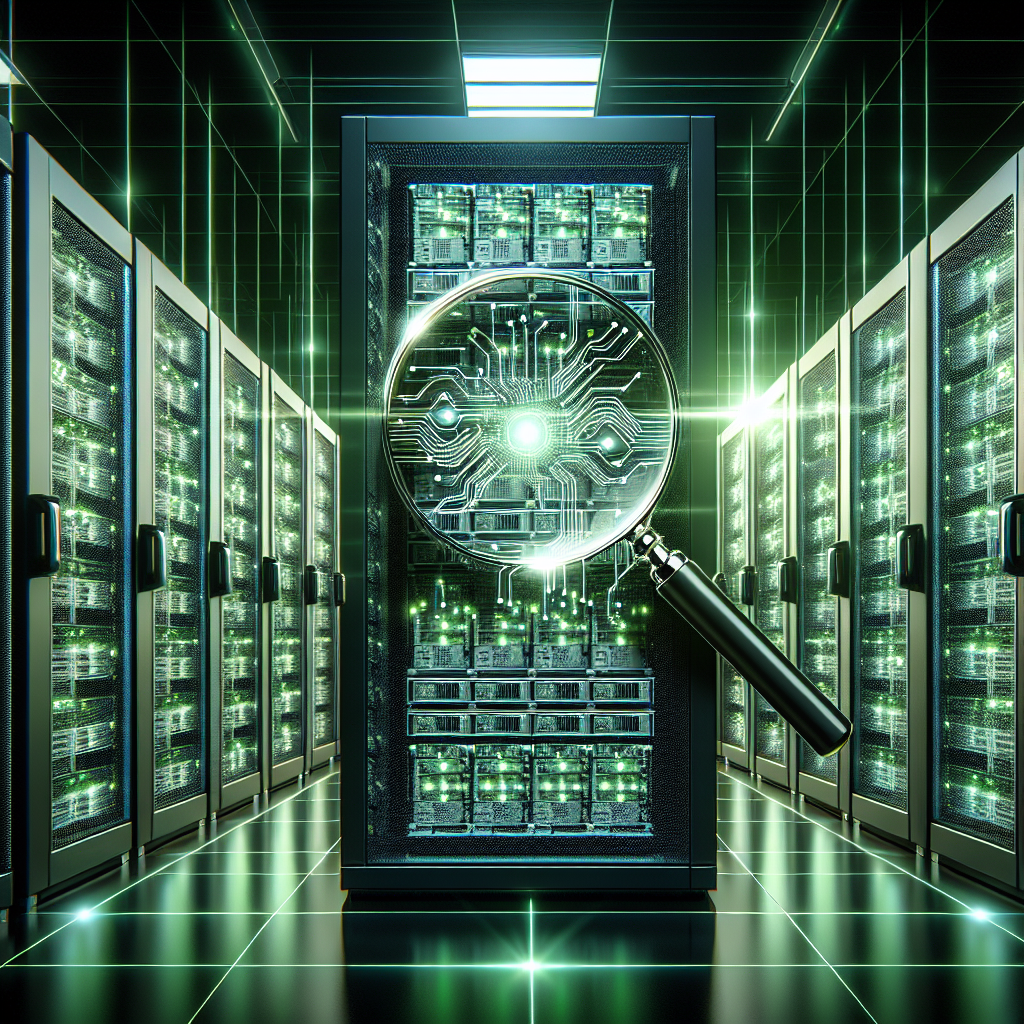Your cart is currently empty!
Tag: Data Center Inspection

Data Center Inspections: A Critical Component of Risk Management and Mitigation
Data centers are the backbone of modern businesses, housing the critical infrastructure that keeps operations running smoothly. With the increasing reliance on data and technology, the importance of ensuring the safety and security of data center facilities cannot be overstated. This is where data center inspections come into play.Data center inspections are a critical component of risk management and mitigation, as they help identify potential hazards and vulnerabilities that could compromise the integrity of the facility. By conducting regular inspections, organizations can proactively address any issues before they escalate into major problems.
During a data center inspection, trained professionals assess various aspects of the facility, including the physical infrastructure, power and cooling systems, fire suppression systems, security measures, and environmental controls. They look for signs of wear and tear, potential fire hazards, electrical faults, and other risks that could impact the operation of the data center.
One of the key benefits of data center inspections is that they provide organizations with a comprehensive view of the current state of their facilities. This information allows them to prioritize maintenance and repairs, allocate resources effectively, and ensure that the data center is operating at peak performance.
In addition to identifying potential risks, data center inspections also play a crucial role in compliance with industry regulations and standards. Many organizations are required to adhere to strict guidelines set forth by regulatory bodies, such as the National Fire Protection Association (NFPA) and the American Society of Heating, Refrigerating and Air-Conditioning Engineers (ASHRAE). By conducting regular inspections, organizations can ensure that their data center facilities meet these requirements and avoid costly penalties.
Furthermore, data center inspections can help organizations optimize their operations and improve efficiency. By identifying areas for improvement, such as outdated equipment or inefficient cooling systems, organizations can make informed decisions about upgrades and investments that will enhance the overall performance of the data center.
Ultimately, data center inspections are a vital tool for organizations looking to mitigate risk and ensure the reliability and security of their data center facilities. By investing in regular inspections, organizations can proactively address potential issues, maintain compliance with industry regulations, and optimize the performance of their data center operations. In today’s digital age, where data is king, data center inspections are not just a best practice – they are a necessity.

Ensuring Regulatory Compliance Through Thorough Data Center Inspections
In today’s fast-paced digital world, data centers play a crucial role in storing, processing, and managing vast amounts of information. As such, ensuring regulatory compliance is essential to protect sensitive data and maintain the trust of customers and stakeholders.One way to achieve regulatory compliance is through thorough data center inspections. These inspections involve a comprehensive review of the physical infrastructure, security measures, and operational processes to ensure that all regulatory requirements are being met.
During a data center inspection, auditors will assess various aspects of the facility, including:
1. Physical security: Auditors will evaluate the physical security measures in place to protect the data center from unauthorized access. This may include reviewing access control systems, surveillance cameras, and security protocols.
2. Environmental controls: Data centers require precise environmental controls to ensure optimal performance and prevent equipment failure. Inspectors will assess the effectiveness of temperature and humidity controls, as well as fire suppression systems.
3. Data protection: Auditors will review data protection measures, such as encryption, backup procedures, and disaster recovery plans, to ensure that sensitive information is secure and can be recovered in the event of a breach.
4. Compliance with regulations: Data centers must comply with various regulations, such as the General Data Protection Regulation (GDPR) and the Health Insurance Portability and Accountability Act (HIPAA). Inspectors will ensure that the data center is meeting these requirements to avoid costly fines and penalties.
By conducting regular data center inspections, organizations can identify and address any potential compliance issues before they escalate into more significant problems. Inspections also provide an opportunity to improve operational efficiency and enhance overall security measures.
To ensure a successful data center inspection, organizations should:
1. Develop a comprehensive inspection checklist that covers all relevant regulatory requirements.
2. Assign a dedicated team to oversee the inspection process and address any findings or recommendations.
3. Work closely with auditors to schedule and conduct inspections at regular intervals.
4. Implement a system for tracking and monitoring compliance efforts, including documenting any corrective actions taken.
In conclusion, ensuring regulatory compliance through thorough data center inspections is essential for protecting sensitive data and maintaining the trust of customers and stakeholders. By conducting regular inspections and addressing any compliance issues promptly, organizations can minimize risks and demonstrate their commitment to data security and privacy.

The Role of Data Center Inspections in Disaster Recovery and Business Continuity Planning
Data centers play a crucial role in the operations of businesses today, as they house the critical infrastructure and data that are essential for day-to-day operations. In the event of a disaster, such as a fire, flood, or cyber-attack, data centers are often the first line of defense in ensuring business continuity. This is why regular inspections of data centers are vital in disaster recovery and business continuity planning.Data center inspections involve a thorough assessment of the physical infrastructure, security measures, and operational protocols in place to ensure that the data center is functioning optimally and is prepared to withstand any potential threats. During an inspection, various aspects of the data center are evaluated, including the power supply, cooling systems, fire suppression systems, and security measures such as access control and surveillance.
One of the main reasons why data center inspections are crucial in disaster recovery and business continuity planning is to identify any vulnerabilities or weaknesses in the data center that could impact its ability to operate in the event of a disaster. By conducting regular inspections, businesses can proactively address any issues and implement measures to mitigate risks, thereby minimizing the impact of a disaster on their operations.
Furthermore, data center inspections also play a key role in ensuring compliance with industry regulations and standards. Many industries, such as healthcare and finance, have strict regulations governing the security and availability of data, and regular inspections help businesses ensure that their data centers meet these requirements.
In addition, data center inspections can also help businesses identify opportunities for improvement and optimization. By evaluating the efficiency of the data center’s infrastructure and operational processes, businesses can identify areas where they can make changes to enhance performance, reduce costs, and increase resilience.
Overall, data center inspections are an essential component of disaster recovery and business continuity planning. By proactively assessing the readiness of their data centers and implementing measures to address any vulnerabilities, businesses can ensure that they are prepared to withstand any potential disasters and continue operating smoothly. Investing in regular inspections of data centers is a wise decision that can ultimately help businesses protect their critical data and maintain business continuity in the face of adversity.

Maximizing Data Center Performance Through Strategic Inspections and Maintenance
Data centers are the backbone of modern businesses, housing the critical infrastructure that supports their operations. Ensuring the optimal performance of a data center is essential to maintaining business continuity and maximizing efficiency. One way to achieve this is through strategic inspections and maintenance.Regular inspections and maintenance activities are crucial for keeping data centers running smoothly. By identifying and addressing potential issues early on, businesses can prevent costly downtime and ensure that their data center continues to operate at peak performance.
There are several key areas that should be included in a data center inspection and maintenance plan. These include:
1. Cooling systems: Data centers generate a significant amount of heat, and cooling systems are essential for maintaining optimal operating temperatures. Regular inspections of cooling systems, including air conditioning units and ventilation systems, can help identify any issues that may be impacting their performance.
2. Power distribution: Data centers rely on a stable power supply to operate effectively. Regular inspections of power distribution systems, including UPS units and electrical wiring, can help ensure that they are functioning properly and are able to support the data center’s power requirements.
3. Networking equipment: The networking equipment in a data center is responsible for facilitating communication between servers and other devices. Regular inspections of networking equipment, including switches and routers, can help identify any issues that may be affecting network performance.
4. Server hardware: Servers are the heart of a data center, and their proper functioning is essential for maintaining business operations. Regular inspections of server hardware, including processors, memory, and storage devices, can help identify any issues that may be impacting their performance.
In addition to regular inspections, businesses should also implement a proactive maintenance strategy to address any issues that are identified during inspections. This may include replacing or upgrading equipment, applying software patches, or implementing changes to improve efficiency and performance.
By investing in strategic inspections and maintenance, businesses can maximize the performance of their data center and ensure that it continues to support their operations effectively. This proactive approach can help prevent costly downtime and ensure that the data center remains a reliable and efficient asset for the organization.

Key Factors to Consider When Conducting a Data Center Inspection
Data centers play a crucial role in the operations of businesses, housing critical IT infrastructure and sensitive data. Regular inspections are essential to ensure that the data center is functioning at optimal levels and to identify any potential issues that could lead to downtime or data loss. When conducting a data center inspection, there are several key factors to consider to ensure that the facility is operating efficiently and securely.One of the first factors to consider when conducting a data center inspection is the physical environment of the facility. This includes checking for proper temperature and humidity levels, adequate ventilation, and proper fire suppression systems. It is important to ensure that the data center is kept at the optimal temperature and humidity levels to prevent equipment overheating and potential damage. Additionally, proper ventilation is crucial to maintain airflow and prevent hot spots within the facility. Fire suppression systems should also be in place and regularly tested to ensure they are functioning properly in the event of a fire.
Another key factor to consider during a data center inspection is the power and cooling systems. It is important to check the capacity and redundancy of the power supply to ensure that the data center can continue to operate in the event of a power outage. Additionally, cooling systems should be inspected to ensure that they are effectively cooling the equipment and maintaining the proper temperature levels within the facility. Regular maintenance and testing of power and cooling systems are essential to prevent downtime and equipment failure.
Security is also a critical factor to consider when conducting a data center inspection. It is important to assess the physical security measures in place, such as access control systems, surveillance cameras, and security guards. Additionally, cybersecurity measures should be evaluated to ensure that the data center is protected from external threats, such as hacking or malware. Regular audits and testing of security systems are necessary to identify any vulnerabilities and address them promptly.
Lastly, documentation and labeling are important factors to consider during a data center inspection. It is essential to have accurate and up-to-date documentation of the data center layout, equipment inventory, and maintenance schedules. Proper labeling of equipment and cables can help to quickly identify and troubleshoot any issues that may arise. Regularly updating and maintaining documentation and labeling can streamline operations and prevent confusion during emergencies.
In conclusion, conducting a thorough data center inspection is essential to ensure the facility is operating efficiently and securely. By considering key factors such as the physical environment, power and cooling systems, security measures, and documentation, businesses can identify and address any potential issues before they lead to downtime or data loss. Regular inspections and maintenance are crucial to the overall health and performance of a data center, ultimately helping to protect critical IT infrastructure and data.

The Importance of Regular Data Center Inspections: Ensuring Operational Efficiency and Security
Data centers serve as the backbone of modern businesses, housing critical IT infrastructure and storing vast amounts of sensitive data. Ensuring the operational efficiency and security of these facilities is crucial for the smooth functioning of any organization. Regular data center inspections play a vital role in achieving this goal.Data center inspections involve a thorough examination of the facility’s physical infrastructure, equipment, and systems to identify potential issues and address them before they escalate into major problems. These inspections are typically conducted by trained professionals who have the expertise to assess various aspects of the data center, such as cooling systems, power distribution, network connectivity, and security measures.
One of the primary benefits of regular data center inspections is the prevention of downtime. Downtime can be extremely costly for businesses, leading to lost revenue, damaged reputation, and decreased productivity. By identifying and resolving issues proactively, data center inspections help minimize the risk of unplanned outages and ensure continuous operation of critical IT systems.
In addition to preventing downtime, regular data center inspections also help improve operational efficiency. By identifying areas for optimization, such as inefficient cooling systems or outdated equipment, inspections can help data center operators streamline their operations and reduce energy consumption. This not only leads to cost savings but also contributes to a more sustainable and environmentally friendly operation.
Furthermore, data center inspections are essential for maintaining the security of the facility. With cyber threats becoming increasingly sophisticated, it is crucial for organizations to ensure that their data centers are well-protected against potential breaches. Inspections help identify vulnerabilities in the facility’s physical and digital security measures, allowing operators to take corrective actions to strengthen their defenses.
Overall, the importance of regular data center inspections cannot be overstated. By proactively identifying and addressing issues, these inspections help ensure the smooth operation of critical IT infrastructure and safeguard sensitive data. In today’s digital age, where data is a valuable asset for businesses, investing in regular inspections is a wise decision that can pay off in terms of operational efficiency, security, and peace of mind.

Ensuring Data Center Resilience: Why Regular Inspections are Essential
In today’s digital age, data centers play a crucial role in storing, managing, and processing vast amounts of information for businesses and organizations. With the increasing reliance on technology, ensuring the resilience of data centers has never been more important. Regular inspections are essential in maintaining the integrity and efficiency of data centers, as they help identify potential issues before they escalate into major problems.Data center resilience refers to the ability of a data center to continue operating seamlessly, even in the face of unexpected disruptions or failures. This resilience is crucial in ensuring that critical systems and data remain accessible and secure at all times. Regular inspections are a key component of maintaining data center resilience, as they provide an opportunity to identify and address potential vulnerabilities in the infrastructure.
During inspections, data center technicians and engineers assess various aspects of the facility, including power systems, cooling systems, networking equipment, and physical security measures. They also evaluate the performance of servers, storage devices, and other hardware components to ensure they are functioning optimally. By conducting these inspections on a regular basis, data center operators can proactively address any issues that may compromise the resilience of the facility.
One of the main reasons why regular inspections are essential for data center resilience is to prevent downtime. Downtime can be costly for businesses, resulting in lost revenue, decreased productivity, and damage to reputation. By identifying and resolving potential issues during inspections, data center operators can minimize the risk of downtime and ensure that critical systems remain operational.
In addition to preventing downtime, regular inspections also help to improve the overall efficiency of data centers. By identifying and addressing inefficiencies in the infrastructure, operators can optimize the performance of systems and reduce energy consumption. This not only saves costs but also contributes to the sustainability of the data center.
Furthermore, regular inspections are essential for maintaining compliance with industry regulations and standards. Many organizations are subject to strict data protection and security regulations, which require data centers to adhere to certain guidelines and best practices. By conducting regular inspections, data center operators can ensure that their facility meets these requirements and avoid potential fines or legal repercussions.
Overall, ensuring data center resilience through regular inspections is crucial for the smooth operation of businesses and organizations. By identifying and addressing potential vulnerabilities, operators can prevent downtime, improve efficiency, and maintain compliance with industry regulations. Investing in regular inspections is a small price to pay for the peace of mind that comes with knowing your data center is secure and reliable.

How Data Center Inspections Can Identify and Mitigate Potential Risks
Data centers are the backbone of modern businesses, housing critical IT infrastructure and data that are essential for operations. With the increasing reliance on data centers, ensuring their reliability and security is paramount. One way to achieve this is through regular inspections to identify and mitigate potential risks.Data center inspections involve a thorough assessment of the facility’s physical infrastructure, equipment, and systems to ensure they are functioning optimally and are in compliance with industry standards and regulations. By conducting regular inspections, data center operators can proactively address any issues before they escalate into major problems that could potentially disrupt operations and compromise data security.
One of the key benefits of data center inspections is the identification of potential risks that could lead to downtime or data loss. For example, inspections can uncover issues such as overheating equipment, inadequate cooling systems, power outages, and faulty cabling, all of which can impact the performance and reliability of the data center. By addressing these risks early on, data center operators can prevent costly downtime and data loss, ensuring business continuity and data security.
In addition to identifying risks, data center inspections also help in mitigating them through remediation and preventive measures. For example, if an inspection reveals that the data center’s cooling systems are not functioning properly, operators can take immediate action to repair or replace the equipment to prevent overheating and potential downtime. Similarly, if the inspection uncovers security vulnerabilities, operators can implement additional security measures to safeguard the data center from cyber threats.
Furthermore, data center inspections can also help in optimizing the efficiency and performance of the facility. By identifying areas where improvements can be made, such as upgrading equipment or reorganizing cabling, operators can enhance the overall performance of the data center, leading to increased reliability and cost savings.
Overall, data center inspections play a critical role in ensuring the reliability, security, and efficiency of data centers. By identifying and mitigating potential risks, operators can prevent costly downtime and data loss, while also optimizing the performance of the facility. Therefore, regular inspections should be a priority for all data center operators to safeguard their critical IT infrastructure and data.

Data Center Inspection Checklist: What to Look for
Data centers are an essential component of modern businesses, housing the critical infrastructure needed to store and manage data. In order to ensure that a data center is functioning properly and efficiently, regular inspections are crucial. A comprehensive data center inspection checklist can help to identify potential issues and prevent downtime. Here are some key things to look for during a data center inspection:1. Physical Security: One of the most important aspects of a data center is its physical security measures. Check for secure access controls, surveillance cameras, and proper fencing. Ensure that only authorized personnel have access to the data center.
2. Environmental Controls: Data centers generate a significant amount of heat, so it is important to have proper cooling systems in place. Check that the temperature and humidity levels are within acceptable ranges to prevent overheating and equipment failure.
3. Power Supply: A reliable power supply is essential for a data center to function properly. Inspect the backup power systems, such as generators and Uninterruptible Power Supply (UPS) units, to ensure they are in good working condition.
4. Fire Suppression Systems: Data centers house valuable equipment and data, so it is important to have proper fire suppression systems in place. Check that fire alarms, smoke detectors, and sprinkler systems are functioning properly.
5. Cable Management: Proper cable management is crucial for maintaining a clean and organized data center. Inspect the cable trays, racks, and pathways to ensure that cables are neatly organized and labeled for easy identification.
6. Equipment Maintenance: Regular maintenance of data center equipment is essential to prevent downtime. Check that servers, switches, and other hardware are clean and free of dust buildup. Inspect for any signs of wear or damage that may indicate the need for repairs or replacements.
7. Documentation: A well-maintained data center should have up-to-date documentation of all equipment, configurations, and procedures. Check that all documentation is current and easily accessible to data center personnel.
8. Compliance with Regulations: Data centers must comply with various regulations and standards, such as the Payment Card Industry Data Security Standard (PCI DSS) and the Health Insurance Portability and Accountability Act (HIPAA). Ensure that the data center is in compliance with all relevant regulations and standards.
By following a comprehensive data center inspection checklist, businesses can ensure that their data center is operating efficiently and securely. Regular inspections can help to identify potential issues before they escalate into costly downtime or data loss. Prioritizing the maintenance and upkeep of a data center is essential for the smooth operation of a business’s critical infrastructure.

The Role of Technology in Streamlining Data Center Inspections
Data centers play a crucial role in the operation of businesses and organizations, as they house and manage the critical IT infrastructure that supports their daily operations. Ensuring that data centers are functioning optimally is essential, and one way to achieve this is through regular inspections. In the past, data center inspections were typically done manually, which could be time-consuming and prone to human error. However, with the advancement of technology, the process has been streamlined and made more efficient.Technology has revolutionized the way data center inspections are conducted, providing tools and solutions that make the process faster, more accurate, and less labor-intensive. One of the key technologies that have been instrumental in streamlining data center inspections is the use of automated inspection tools. These tools can perform tasks such as monitoring temperature, humidity, and power consumption in real-time, alerting data center operators to any issues that may arise. This proactive approach allows for faster response times and helps prevent potential downtime or equipment failures.
In addition to automated inspection tools, the use of data analytics and machine learning has also played a significant role in improving data center inspections. By analyzing data from various sensors and monitoring devices, data center operators can gain valuable insights into the performance of their infrastructure and identify areas that may require attention. Machine learning algorithms can also help predict potential failures before they occur, allowing for preventative maintenance to be carried out.
Furthermore, the use of remote monitoring and management solutions has made it easier for data center operators to conduct inspections from anywhere, at any time. These solutions allow operators to remotely access and monitor their data center infrastructure, making it possible to identify and address issues without the need for on-site visits. This not only saves time and resources but also reduces the risk of human error associated with manual inspections.
Overall, technology has played a crucial role in streamlining data center inspections, making them more efficient, accurate, and cost-effective. By leveraging automated inspection tools, data analytics, machine learning, and remote monitoring solutions, data center operators can ensure that their infrastructure is operating at peak performance and mitigate the risk of downtime. As technology continues to advance, we can expect further innovations that will further enhance the efficiency and effectiveness of data center inspections.
